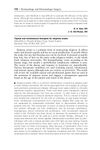 February 2013 in “Social Science Research Network”
February 2013 in “Social Science Research Network” Some people pay $240 for medication that costs $9 due to drug industry tactics and complicated healthcare policies.
January 2023 in “European journal of biology and medical science research” PCOS symptoms can be managed with medication and lifestyle changes.
 23 citations,
October 2018 in “Expert Opinion on Drug Safety”
23 citations,
October 2018 in “Expert Opinion on Drug Safety” Consider benefits and risks of new alopecia treatments for safety.
 January 2012 in “The Year book of dermatology”
January 2012 in “The Year book of dermatology” Many treatments for alopecia areata have inconsistent results; for under 10s, use minoxidil with a corticosteroid, and for over 10s, add ILC and consider diphenylcyclopropenone for widespread cases.
July 2002 in “Journal of cosmetic dermatology” Hair loss can be treated with medications like finasteride and surgical methods like hair transplants.
 5 citations,
November 2007 in “British journal of nursing”
5 citations,
November 2007 in “British journal of nursing” Nurses should treat emollients as medications, understanding their use and effects for treating skin conditions.
February 2025 in “Skin Appendage Disorders” GLP-1 receptor agonists can cause skin reactions, facial fat loss, and hair loss, but may help with wound healing and skin conditions.
 April 2020 in “The Journal of Urology”
April 2020 in “The Journal of Urology” Big chain pharmacies in Pennsylvania charge significantly more for generic BPH medications than independent pharmacies, but independent pharmacies have more regional price variation.
February 2019 in “Urology” Generic drugs for benign prostatic hyperplasia can cost up to 500% more at chain pharmacies compared to independent ones.
January 2016 in “China Medical Abstracts(Dermatology)” Treat androgenetic alopecia early with recommended medications or consider hair grafts and wigs if unresponsive.
 14 citations,
October 2019 in “International Journal of Women's Health”
14 citations,
October 2019 in “International Journal of Women's Health” Menopausal acne is treated with medications and lifestyle changes, but careful choice is needed due to side effects.
40 citations,
July 2011 in “The journal of clinical hypertension” Hydralazine and minoxidil are blood pressure medications that relax blood vessels, with potential side effects like rapid heartbeat and fluid retention, and are used for severe or pregnancy-related hypertension.
May 2021 in “Veterinarìâ, tehnologìï tvarinnictva ta prirodokoristuvannâ” Treating sheep and wild goats with specific medications and bathing sheep was 100% effective against a contagious skin disease caused by mites.
 January 1983 in “Side effects of drugs annual”
January 1983 in “Side effects of drugs annual” Beta-blockers and anti-anginal medications have various side effects and interactions that require careful monitoring and individualized treatment.
1 citations,
January 2009 in “Gynecological endocrinology” Hirsutism can be treated with medications or hair removal methods, tailored to each person.
 October 2023 in “Facial Plastic Surgery”
October 2023 in “Facial Plastic Surgery” New treatments for common hair loss include medications, regenerative therapies, and laser therapy, but may not work for everyone.
 October 2015 in “Elsevier eBooks”
October 2015 in “Elsevier eBooks” Spironolactone can cause side effects like high potassium levels and breast enlargement, and patients need careful monitoring.
43 citations,
December 1993 in “Annals of internal medicine” Flutamide, a medication used for excessive hair growth, can cause severe liver damage in women.
 55 citations,
December 2006 in “Journal of The American Academy of Dermatology”
55 citations,
December 2006 in “Journal of The American Academy of Dermatology” Antidepressants called SSRIs can cause skin problems, bleeding risk, and other side effects.
 January 2007 in “Journal of The American Academy of Dermatology”
January 2007 in “Journal of The American Academy of Dermatology” Propylthiouracil, a thyroid medication, can cause skin blood clots and immune-related blood vessel inflammation.
 8 citations,
June 2016 in “Journal of Pharmacy Practice”
8 citations,
June 2016 in “Journal of Pharmacy Practice” Lisinopril, a heart medication, probably caused hair loss in a patient, which stopped after switching drugs.
November 2007 in “Hospital pharmacy” The conclusion is that healthcare professionals should report adverse drug reactions to improve medication safety and patient care.
July 2024 in “Behavioural Brain Research” Long-term finasteride treatment reduces depression and brain issues in obese male rats.
7 citations,
June 2007 in “AIDS” A man's hair loss was linked to his HIV medication, which improved after changing drugs.
 9 citations,
August 2002 in “Current Opinion in Pediatrics”
9 citations,
August 2002 in “Current Opinion in Pediatrics” An 18-year-old girl with pemphigus vulgaris needed strong medication and careful treatment due to ineffective initial therapies and side effects.
 November 2009 in “Hair transplant forum international”
November 2009 in “Hair transplant forum international” Doctors should collaborate with the patient's primary care physician to decide if it's safe to stop taking Plavix before hair restoration surgery, considering the risk and benefit.
 26 citations,
March 2014 in “International journal of pharmaceutics”
26 citations,
March 2014 in “International journal of pharmaceutics” Researchers created a skin treatment that could effectively deliver medication into hair follicles.
16 citations,
April 2014 in “Anais brasileiros de dermatologia/Anais Brasileiros de Dermatologia” A patient lost all their hair while on rheumatoid arthritis medication.
 5 citations,
December 1981 in “PubMed”
5 citations,
December 1981 in “PubMed” Metoprolol, a blood pressure medication, was linked to reversible hair loss.
 53 citations,
October 2012 in “The FASEB Journal”
53 citations,
October 2012 in “The FASEB Journal” Bimatoprost, a glaucoma medication, may also help treat hair loss.

















